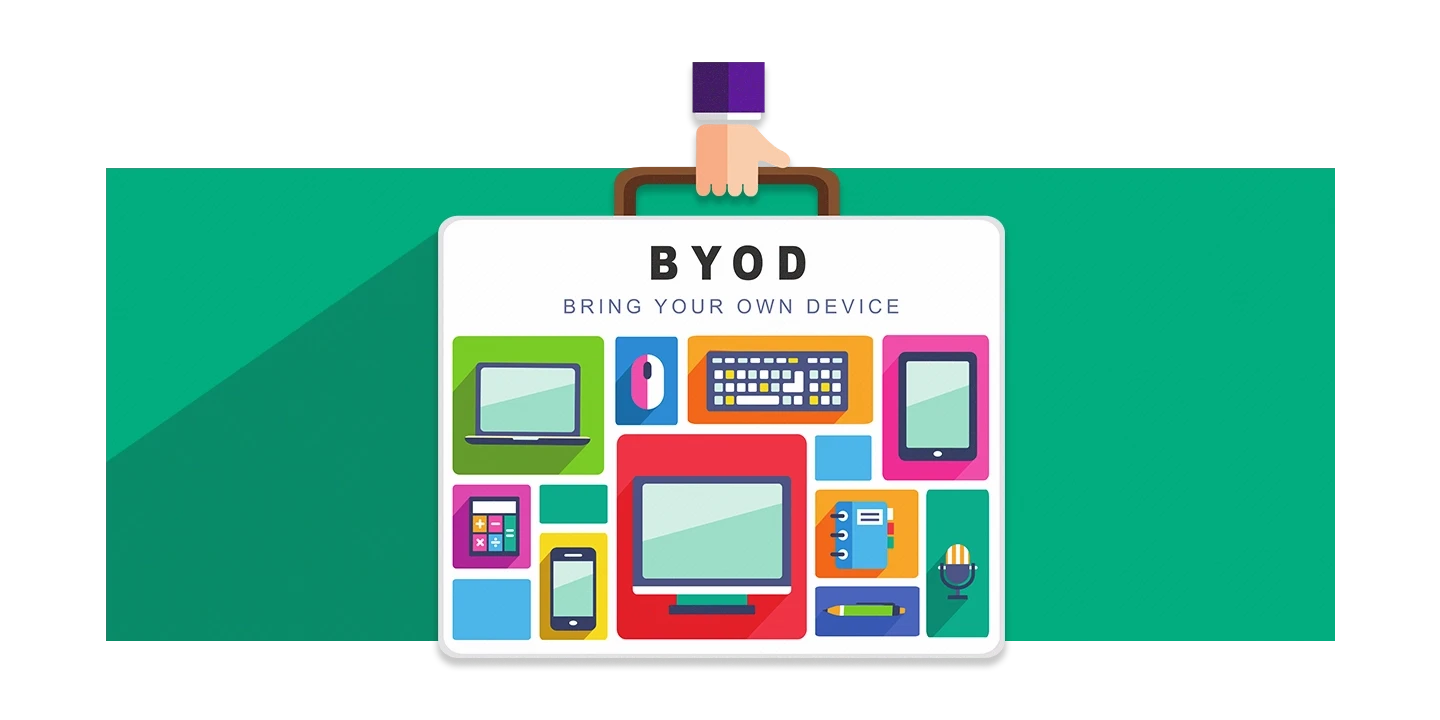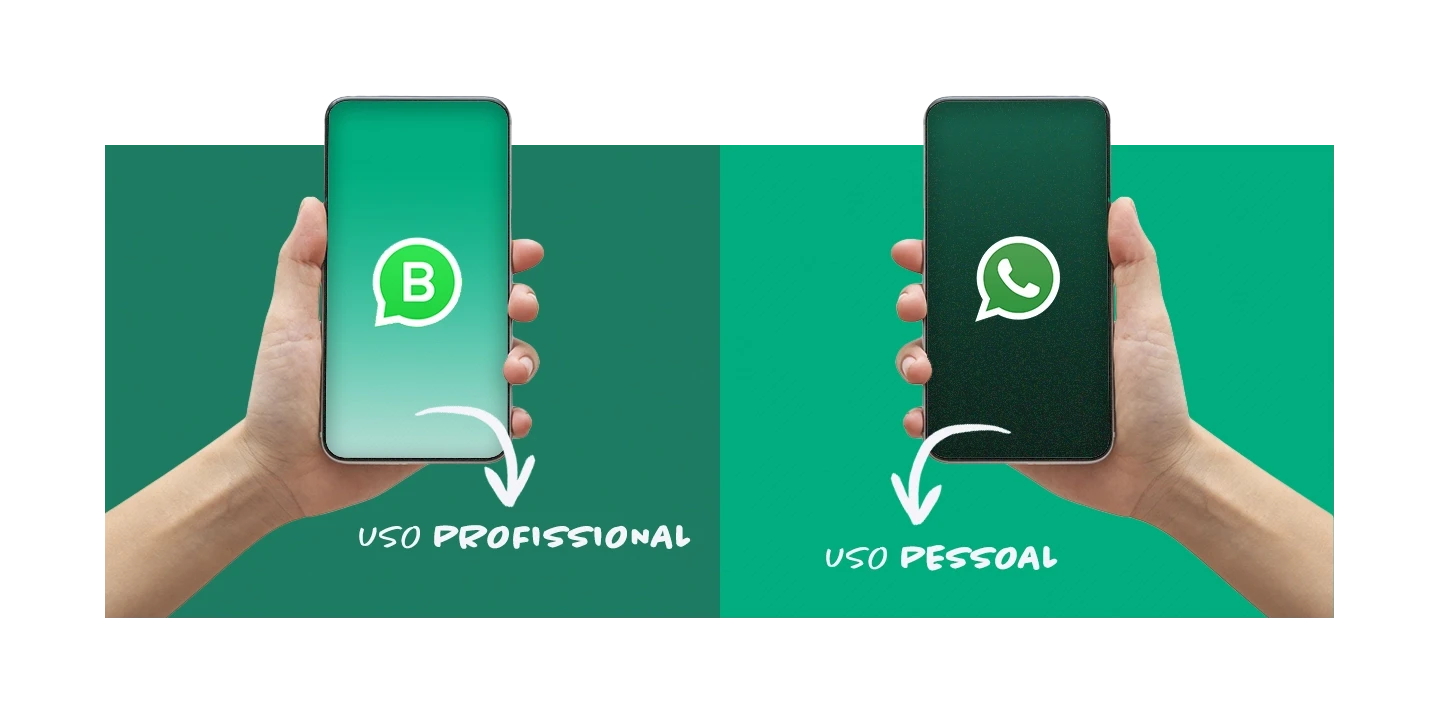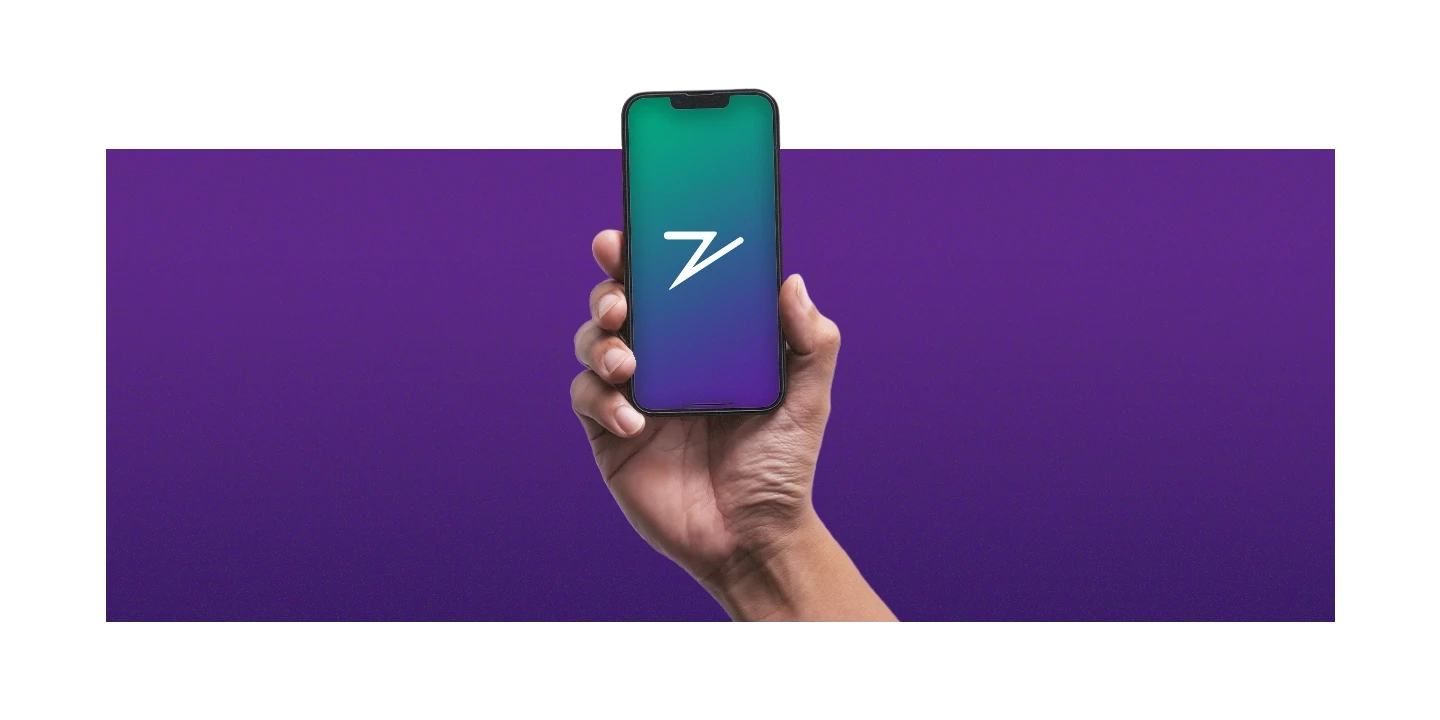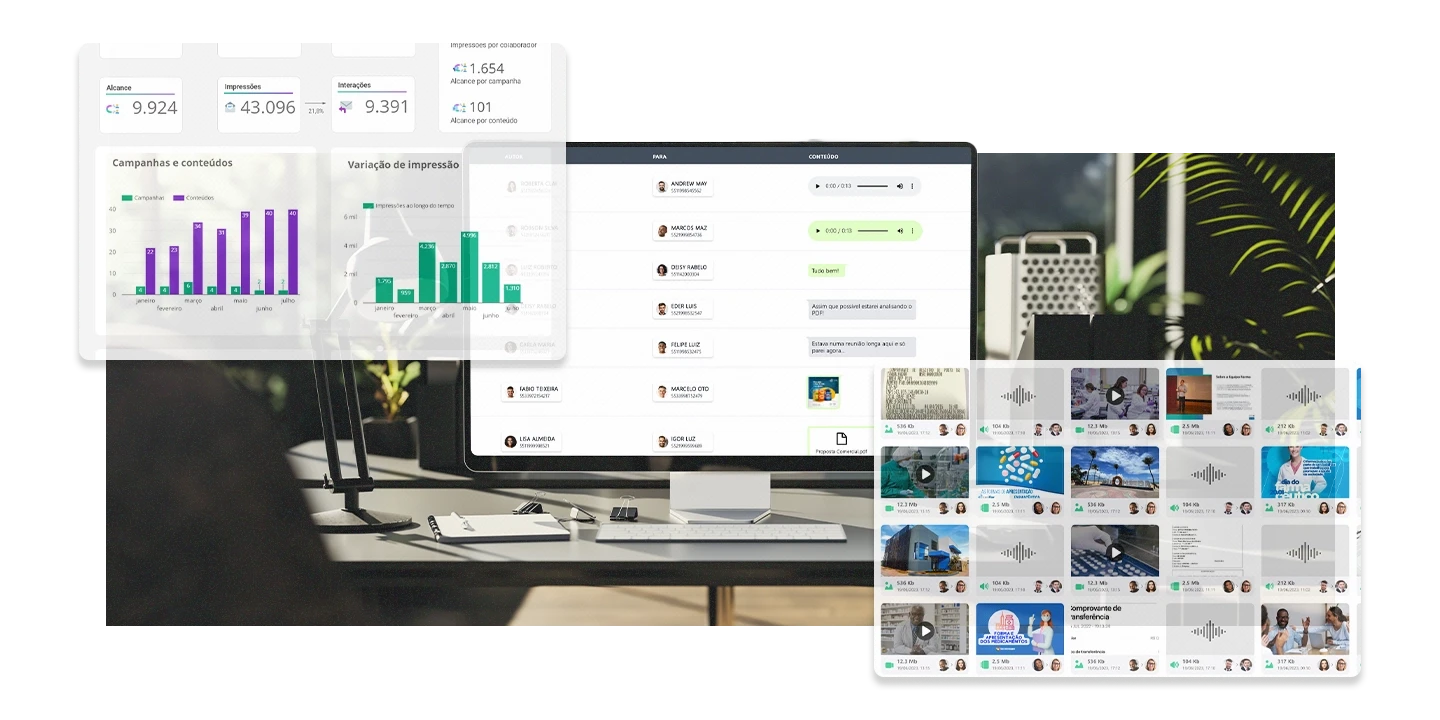
August 20, 2024
Personal cell phone and corporate WhatsApp: how does the company's cybersecurity stand?
The monitoring of the company's accounts is the alternative to prevent data leakage.

August 20, 2024
Personal cell phone and corporate WhatsApp: how does the company's cybersecurity stand?
The monitoring of the company's accounts is the alternative to prevent data leakage.

August 20, 2024
Personal cell phone and corporate WhatsApp: how does the company's cybersecurity stand?
The monitoring of the company's accounts is the alternative to prevent data leakage.
Since organizations adopted the remote work system and WhatsApp for communications between teams and third parties, managers have had to face a major challenge: control over corporate messages.
Unlike in times of in-person work, where employees used all the resources provided by the company for messaging, today, due to practicality and cost efficiency, professionals have started using their personal smartphones to communicate with their team and clients/suppliers.
See also: WhatsApp in companies: how to formalize?
Benefits of using the employee's smartphone
Opting for personal smartphones is a widely adopted strategy by companies worldwide and is known by the acronym BYOD (Bring Your Own Device).

Among the advantages of resorting to this tactic, first and foremost is the cost savings for companies, which do not need to purchase devices, hire insurance against loss and theft, or incur maintenance expenses.
A second very important point is that the employee is already accustomed to using the device and will not face difficulties in addressing matters with the company or even with clients from their own device.
In third place, WhatsApp is already installed on the devices of almost all employees, so access to this platform is already known to everyone, as is the use of the app, which greatly facilitates communication with the company’s entire network of contacts.

But there are not only advantages. When an employee communicates with the work team and clients from their own device and WhatsApp account, the employer is excluded from the communication, leaving corporate information more vulnerable.
This vulnerability is what generates serious problems such as leaks of confidential data, threatening the company's cybersecurity and resulting in lawsuits, heavy fines, and governmental sanctions.
See also: Is your company's WhatsApp really secure?
In this context, how can one access what the employee is discussing with clients? How can it be ensured that they are following the corporation’s rules and policies? How can one guarantee that user data will not be misused?
Best practices for using WhatsApp and employing BYOD
To balance the benefits of BYOD with the need to protect the company's cybersecurity, it is essential for the organization to adopt best practices, such as providing the employee with an exclusive corporate number. This number should be set up on a new WhatsApp Business account to clearly separate personal communications from professional ones.

By using two versions of WhatsApp on the same device, the employee maintains their privacy using the regular app, while the company retains control over corporate interactions in the Business app. This separation not only facilitates monitoring of business communications but also ensures that the company's rules and policies are followed.
This practice strengthens the company's data security, promoting transparency in interactions with clients and partners, and ensuring that the use of WhatsApp complies with applicable security, privacy, and regulatory requirements.
WhatsApp monitoring and corporate communication governance
Monitoring employee productivity, supervising employee conduct during customer service, and protecting strategic information have always been the main concerns of companies.
See also: Main questions about corporate WhatsApp monitoring
With the digitalization of work processes and the full-time use of WhatsApp, governance over corporate communication has become decentralized, requiring new solutions to preserve the security of app users and the corporation itself.
A strategy to meet these needs is monitoring interactions via WhatsApp, which has become possible with the emergence of Zapper, the first platform in Latin America to monitor corporate WhatsApp accounts for compliance, cybersecurity, and business intelligence purposes.

With Zapper, it is possible to monitor conversations between employees and third parties, even if the messaging app is on a personal smartphone. All WhatsApp numbers used by the organization can be monitored on smartphones, tablets, and laptops with total security and privacy, and the content of interactions is saved in the cloud with exclusive access for an indefinite period.
Zapper recommends that monitoring occurs only on corporate accounts, separating the employee’s personal account, which would be considered an invasion of privacy.
If any employee disconnects from the tool, a notification is sent to the manager, who can contact the user to request a new connection to Zapper, thus minimizing the risk of corporate WhatsApp being used without the employer's knowledge.
Once connected to the platform, Zapper will track the dialogues that occur on the WhatsApp account and can send feedback to the manager regarding the timing of contacts or detect suspicious conversations involving misconduct and the sending of files, avoiding the disclosure of the company's private data.

When any irregularity is detected in the dialogues, an alert is sent to the manager, who can intervene in the communication immediately if necessary.
After proper treatment of the stored information, meeting the requirements of the LGPD, the data is compiled into analytical reports, created from the filters the manager determines.
See also: LGPD and WhatsApp: What You Need to Know
In addition to protecting the company from possible fraud and unauthorized data disclosure, Zapper obtains important insights from conversational intelligence extracted from dialogues, further contributing to the organization's strategies.
Choosing to use WhatsApp at work or allowing the use of personal devices for company communication has ceased to be a problem as long as there is governance over the content of conversations between employees and third parties. Zapper has come to facilitate this!
Click here to schedule a demonstration of the tool.
Since organizations adopted the remote work system and WhatsApp for communications between teams and third parties, managers have had to face a major challenge: control over corporate messages.
Unlike in times of in-person work, where employees used all the resources provided by the company for messaging, today, due to practicality and cost efficiency, professionals have started using their personal smartphones to communicate with their team and clients/suppliers.
See also: WhatsApp in companies: how to formalize?
Benefits of using the employee's smartphone
Opting for personal smartphones is a widely adopted strategy by companies worldwide and is known by the acronym BYOD (Bring Your Own Device).

Among the advantages of resorting to this tactic, first and foremost is the cost savings for companies, which do not need to purchase devices, hire insurance against loss and theft, or incur maintenance expenses.
A second very important point is that the employee is already accustomed to using the device and will not face difficulties in addressing matters with the company or even with clients from their own device.
In third place, WhatsApp is already installed on the devices of almost all employees, so access to this platform is already known to everyone, as is the use of the app, which greatly facilitates communication with the company’s entire network of contacts.

But there are not only advantages. When an employee communicates with the work team and clients from their own device and WhatsApp account, the employer is excluded from the communication, leaving corporate information more vulnerable.
This vulnerability is what generates serious problems such as leaks of confidential data, threatening the company's cybersecurity and resulting in lawsuits, heavy fines, and governmental sanctions.
See also: Is your company's WhatsApp really secure?
In this context, how can one access what the employee is discussing with clients? How can it be ensured that they are following the corporation’s rules and policies? How can one guarantee that user data will not be misused?
Best practices for using WhatsApp and employing BYOD
To balance the benefits of BYOD with the need to protect the company's cybersecurity, it is essential for the organization to adopt best practices, such as providing the employee with an exclusive corporate number. This number should be set up on a new WhatsApp Business account to clearly separate personal communications from professional ones.

By using two versions of WhatsApp on the same device, the employee maintains their privacy using the regular app, while the company retains control over corporate interactions in the Business app. This separation not only facilitates monitoring of business communications but also ensures that the company's rules and policies are followed.
This practice strengthens the company's data security, promoting transparency in interactions with clients and partners, and ensuring that the use of WhatsApp complies with applicable security, privacy, and regulatory requirements.
WhatsApp monitoring and corporate communication governance
Monitoring employee productivity, supervising employee conduct during customer service, and protecting strategic information have always been the main concerns of companies.
See also: Main questions about corporate WhatsApp monitoring
With the digitalization of work processes and the full-time use of WhatsApp, governance over corporate communication has become decentralized, requiring new solutions to preserve the security of app users and the corporation itself.
A strategy to meet these needs is monitoring interactions via WhatsApp, which has become possible with the emergence of Zapper, the first platform in Latin America to monitor corporate WhatsApp accounts for compliance, cybersecurity, and business intelligence purposes.

With Zapper, it is possible to monitor conversations between employees and third parties, even if the messaging app is on a personal smartphone. All WhatsApp numbers used by the organization can be monitored on smartphones, tablets, and laptops with total security and privacy, and the content of interactions is saved in the cloud with exclusive access for an indefinite period.
Zapper recommends that monitoring occurs only on corporate accounts, separating the employee’s personal account, which would be considered an invasion of privacy.
If any employee disconnects from the tool, a notification is sent to the manager, who can contact the user to request a new connection to Zapper, thus minimizing the risk of corporate WhatsApp being used without the employer's knowledge.
Once connected to the platform, Zapper will track the dialogues that occur on the WhatsApp account and can send feedback to the manager regarding the timing of contacts or detect suspicious conversations involving misconduct and the sending of files, avoiding the disclosure of the company's private data.

When any irregularity is detected in the dialogues, an alert is sent to the manager, who can intervene in the communication immediately if necessary.
After proper treatment of the stored information, meeting the requirements of the LGPD, the data is compiled into analytical reports, created from the filters the manager determines.
See also: LGPD and WhatsApp: What You Need to Know
In addition to protecting the company from possible fraud and unauthorized data disclosure, Zapper obtains important insights from conversational intelligence extracted from dialogues, further contributing to the organization's strategies.
Choosing to use WhatsApp at work or allowing the use of personal devices for company communication has ceased to be a problem as long as there is governance over the content of conversations between employees and third parties. Zapper has come to facilitate this!
Click here to schedule a demonstration of the tool.
Since organizations adopted the remote work system and WhatsApp for communications between teams and third parties, managers have had to face a major challenge: control over corporate messages.
Unlike in times of in-person work, where employees used all the resources provided by the company for messaging, today, due to practicality and cost efficiency, professionals have started using their personal smartphones to communicate with their team and clients/suppliers.
See also: WhatsApp in companies: how to formalize?
Benefits of using the employee's smartphone
Opting for personal smartphones is a widely adopted strategy by companies worldwide and is known by the acronym BYOD (Bring Your Own Device).

Among the advantages of resorting to this tactic, first and foremost is the cost savings for companies, which do not need to purchase devices, hire insurance against loss and theft, or incur maintenance expenses.
A second very important point is that the employee is already accustomed to using the device and will not face difficulties in addressing matters with the company or even with clients from their own device.
In third place, WhatsApp is already installed on the devices of almost all employees, so access to this platform is already known to everyone, as is the use of the app, which greatly facilitates communication with the company’s entire network of contacts.

But there are not only advantages. When an employee communicates with the work team and clients from their own device and WhatsApp account, the employer is excluded from the communication, leaving corporate information more vulnerable.
This vulnerability is what generates serious problems such as leaks of confidential data, threatening the company's cybersecurity and resulting in lawsuits, heavy fines, and governmental sanctions.
See also: Is your company's WhatsApp really secure?
In this context, how can one access what the employee is discussing with clients? How can it be ensured that they are following the corporation’s rules and policies? How can one guarantee that user data will not be misused?
Best practices for using WhatsApp and employing BYOD
To balance the benefits of BYOD with the need to protect the company's cybersecurity, it is essential for the organization to adopt best practices, such as providing the employee with an exclusive corporate number. This number should be set up on a new WhatsApp Business account to clearly separate personal communications from professional ones.

By using two versions of WhatsApp on the same device, the employee maintains their privacy using the regular app, while the company retains control over corporate interactions in the Business app. This separation not only facilitates monitoring of business communications but also ensures that the company's rules and policies are followed.
This practice strengthens the company's data security, promoting transparency in interactions with clients and partners, and ensuring that the use of WhatsApp complies with applicable security, privacy, and regulatory requirements.
WhatsApp monitoring and corporate communication governance
Monitoring employee productivity, supervising employee conduct during customer service, and protecting strategic information have always been the main concerns of companies.
See also: Main questions about corporate WhatsApp monitoring
With the digitalization of work processes and the full-time use of WhatsApp, governance over corporate communication has become decentralized, requiring new solutions to preserve the security of app users and the corporation itself.
A strategy to meet these needs is monitoring interactions via WhatsApp, which has become possible with the emergence of Zapper, the first platform in Latin America to monitor corporate WhatsApp accounts for compliance, cybersecurity, and business intelligence purposes.

With Zapper, it is possible to monitor conversations between employees and third parties, even if the messaging app is on a personal smartphone. All WhatsApp numbers used by the organization can be monitored on smartphones, tablets, and laptops with total security and privacy, and the content of interactions is saved in the cloud with exclusive access for an indefinite period.
Zapper recommends that monitoring occurs only on corporate accounts, separating the employee’s personal account, which would be considered an invasion of privacy.
If any employee disconnects from the tool, a notification is sent to the manager, who can contact the user to request a new connection to Zapper, thus minimizing the risk of corporate WhatsApp being used without the employer's knowledge.
Once connected to the platform, Zapper will track the dialogues that occur on the WhatsApp account and can send feedback to the manager regarding the timing of contacts or detect suspicious conversations involving misconduct and the sending of files, avoiding the disclosure of the company's private data.

When any irregularity is detected in the dialogues, an alert is sent to the manager, who can intervene in the communication immediately if necessary.
After proper treatment of the stored information, meeting the requirements of the LGPD, the data is compiled into analytical reports, created from the filters the manager determines.
See also: LGPD and WhatsApp: What You Need to Know
In addition to protecting the company from possible fraud and unauthorized data disclosure, Zapper obtains important insights from conversational intelligence extracted from dialogues, further contributing to the organization's strategies.
Choosing to use WhatsApp at work or allowing the use of personal devices for company communication has ceased to be a problem as long as there is governance over the content of conversations between employees and third parties. Zapper has come to facilitate this!
Click here to schedule a demonstration of the tool.
Since organizations adopted the remote work system and WhatsApp for communications between teams and third parties, managers have had to face a major challenge: control over corporate messages.
Unlike in times of in-person work, where employees used all the resources provided by the company for messaging, today, due to practicality and cost efficiency, professionals have started using their personal smartphones to communicate with their team and clients/suppliers.
See also: WhatsApp in companies: how to formalize?
Benefits of using the employee's smartphone
Opting for personal smartphones is a widely adopted strategy by companies worldwide and is known by the acronym BYOD (Bring Your Own Device).

Among the advantages of resorting to this tactic, first and foremost is the cost savings for companies, which do not need to purchase devices, hire insurance against loss and theft, or incur maintenance expenses.
A second very important point is that the employee is already accustomed to using the device and will not face difficulties in addressing matters with the company or even with clients from their own device.
In third place, WhatsApp is already installed on the devices of almost all employees, so access to this platform is already known to everyone, as is the use of the app, which greatly facilitates communication with the company’s entire network of contacts.

But there are not only advantages. When an employee communicates with the work team and clients from their own device and WhatsApp account, the employer is excluded from the communication, leaving corporate information more vulnerable.
This vulnerability is what generates serious problems such as leaks of confidential data, threatening the company's cybersecurity and resulting in lawsuits, heavy fines, and governmental sanctions.
See also: Is your company's WhatsApp really secure?
In this context, how can one access what the employee is discussing with clients? How can it be ensured that they are following the corporation’s rules and policies? How can one guarantee that user data will not be misused?
Best practices for using WhatsApp and employing BYOD
To balance the benefits of BYOD with the need to protect the company's cybersecurity, it is essential for the organization to adopt best practices, such as providing the employee with an exclusive corporate number. This number should be set up on a new WhatsApp Business account to clearly separate personal communications from professional ones.

By using two versions of WhatsApp on the same device, the employee maintains their privacy using the regular app, while the company retains control over corporate interactions in the Business app. This separation not only facilitates monitoring of business communications but also ensures that the company's rules and policies are followed.
This practice strengthens the company's data security, promoting transparency in interactions with clients and partners, and ensuring that the use of WhatsApp complies with applicable security, privacy, and regulatory requirements.
WhatsApp monitoring and corporate communication governance
Monitoring employee productivity, supervising employee conduct during customer service, and protecting strategic information have always been the main concerns of companies.
See also: Main questions about corporate WhatsApp monitoring
With the digitalization of work processes and the full-time use of WhatsApp, governance over corporate communication has become decentralized, requiring new solutions to preserve the security of app users and the corporation itself.
A strategy to meet these needs is monitoring interactions via WhatsApp, which has become possible with the emergence of Zapper, the first platform in Latin America to monitor corporate WhatsApp accounts for compliance, cybersecurity, and business intelligence purposes.

With Zapper, it is possible to monitor conversations between employees and third parties, even if the messaging app is on a personal smartphone. All WhatsApp numbers used by the organization can be monitored on smartphones, tablets, and laptops with total security and privacy, and the content of interactions is saved in the cloud with exclusive access for an indefinite period.
Zapper recommends that monitoring occurs only on corporate accounts, separating the employee’s personal account, which would be considered an invasion of privacy.
If any employee disconnects from the tool, a notification is sent to the manager, who can contact the user to request a new connection to Zapper, thus minimizing the risk of corporate WhatsApp being used without the employer's knowledge.
Once connected to the platform, Zapper will track the dialogues that occur on the WhatsApp account and can send feedback to the manager regarding the timing of contacts or detect suspicious conversations involving misconduct and the sending of files, avoiding the disclosure of the company's private data.

When any irregularity is detected in the dialogues, an alert is sent to the manager, who can intervene in the communication immediately if necessary.
After proper treatment of the stored information, meeting the requirements of the LGPD, the data is compiled into analytical reports, created from the filters the manager determines.
See also: LGPD and WhatsApp: What You Need to Know
In addition to protecting the company from possible fraud and unauthorized data disclosure, Zapper obtains important insights from conversational intelligence extracted from dialogues, further contributing to the organization's strategies.
Choosing to use WhatsApp at work or allowing the use of personal devices for company communication has ceased to be a problem as long as there is governance over the content of conversations between employees and third parties. Zapper has come to facilitate this!
Click here to schedule a demonstration of the tool.

Claudia Campanhã
Journalist, broadcaster, and postgraduate in social media from FAAP

Claudia Campanhã
Journalist, broadcaster, and postgraduate in social media from FAAP

Claudia Campanhã
Journalist, broadcaster, and postgraduate in social media from FAAP
Share:
Share:
Share:
Share: